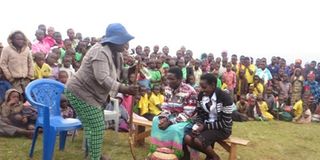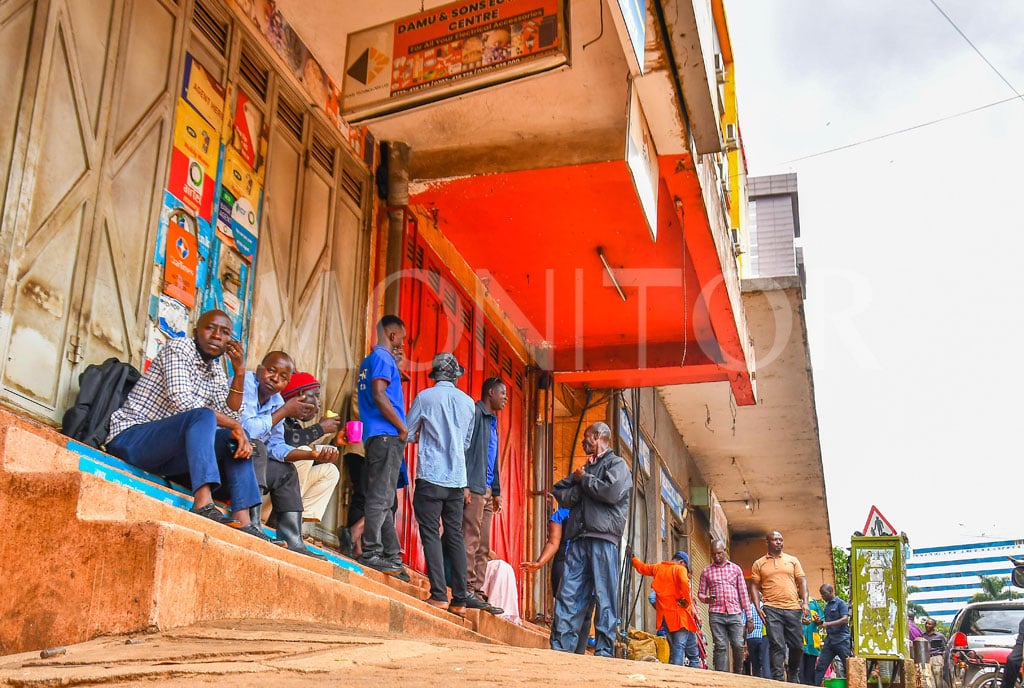Using drama, songs to fight FGM

Women particiapte in a drama by REACH Uganda intended to empower them to say no to FGM. Photo by David Mafabi
What you need to know:
Culture. Young girls in Sebei sub-region have to undergo FGM before they can be regarded as responsible women of the community and although government has put in place laws to fight the vice, it remains prominent in many communities who regard it as a rite of passage.
A group of women and men appear on stage, now turned into a traditional courtyard for Female Genital Mutilation in Bukwo District.
“This young girl has refused to get circumcised, pave way for her, and let the ‘surgeon’ come. We shall force her because this is our culture,” the group choruses as they forcefully carry the girl to the FGM surgeon.
As the surgeon appears with her knife, the young girl fights back and tells them she won’t take circumcision but they wrestle her to the ground and as the surgeon bends to cut her, another young girl appears on the scene and restrains them.
“Why are you killing this young girl? Why do you want to circumcise her? FGM must stop now to restore dignity of the girl-child. You will be arrested and imprisoned. This practice must end and we request all of you to join us in this fight,” says Evelyn Chemtai, 19, her voice mimicking an elderly woman. “We need respect as girls and women. FGM is outdated. It is a health risk, inhumane and an abuse of rights of every girl and woman. We must stop FGM,” she adds.
The villagers, who were determined to circumcise the young girl, were dazed when Chemtai approached them with these words.
The girls in the audience laugh at Chemtai who wears a blue head scarf, which she holds together under her chin with one hand, and tries to explain to the audience why the tradition of female circumcision is bad.
Everyone released the girl at once and stood still as they watched the young girl pronounce this.
Although the group forcing the girl into FGM were surprised when they heard this, they, listened to Chemtai, looked at the young girl, and although there seemed a feeling of a burden weighing heavily upon them to speak back, an inner voice restrained them and at once they released the victim.
The misery this girl goes through typifies the misfortune faced by thousands of young girls in Sebei sub-region where tradition does not give them an opportunity to speak their mind and say no to FGM.
This is a scene in the play ‘We shall end FGM, restore dignity of the girl-child, rekindle their hope’, that was staged in every community to sensitise people about the dangers of FGM.
Young girls in Sebei are expected to undergo FGM before they can be regarded as women and perform other duties such as attending village meetings, serving food to newly-circumcised boys, smearing houses, getting food from granaries as well as being leaders or speaking in public.
Anti-FGM activists now use theatre and drama to enlighten people to discard the practice that had persisted in Sebei sub-region despite the government ban.
The plays and songs emphasise that girls and women have rights and that it is up to them to decide the right cultures that can help initiate them into adulthood.
The drama highlights the constitutional provisions like the duties of a citizen and women emancipation through education to discard the harmful FGM that is practiced in Kapchorwa, Kween, Bukwo and Amudat districts.
Under the programme, REACH, has initiated the participation of Sabiny irrespective of sex, educational background and age in a wide range of civic education programmes through face-to-face meetings at their homes, drama, and songs to end FGM.
During the 30th Sabiny Cultural day at Boma grounds in Bukwo last year, the executive director of REACH, Beatrice Chelangat, stated that the purpose of drama is to fight FGM, which is a violation of human rights and a danger to the health of women and the girl-child.
“Although Article 5 of the Universal Declaration of Human Rights says no one shall be subjected to torture or cruel, inhuman or degrading treatment or punishment, many of the Sabiny don’t know this. That is why they force girls into FGM. Our target now should be to bring these rights down to these people in Kupsabiny. Teach them children’s rights and women emancipation,” she said.
According to Bukwo Elders Forum chairman Stephen Anguria, although there is a law prohibiting FGM, the practice still persists among the Sabiny and Karimojong communities.
“Do you know that it now takes place in caves, bushes and across Kenya in a place called Kisawai in Trans-Nzoia where about 100 girls are mutilated daily? We need massive sensitisation and education to end this,” he said.
Out of misfortune, many circumcised women have found a new calling. They are now vocal advocates through songs and drama for eliminating female genital mutilation/cutting (FGM/C) in this remote, mountainous sub-region.
The young girls in the play are part of a growing network of women and men who are working for the complete elimination of this harmful practice, which leaves many suffering incontinence, excessive bleeding, urine retention, paralysis and even death during childbirth, leaving many women at risk of HIV and other infections as well as psychological trauma.
Chelangat also said women leaders narrate personal experiences as victims of the practice without shame or fear.
The programme was funded by United Nations Population fund [UNFPA] in partnership with government of Uganda the Reproductive Education and Community Health (REACH), is an advocacy NGO against female circumcision.
The Kapchorwa Civil Organisations Alliance (KACSOA) has also initiated a range of activities including local drama to raise awareness against FGM.




